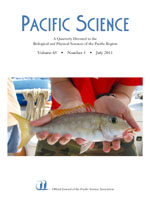The Pacific sheath-tailed bat (Emballonura semicaudata rotensis) and Mariana swiftlet (Aerodramus bartschi) are two rare insectivorous taxa restricted to the southern Mariana Islands in western Micronesia. It is believed that populations of both have dwindled because of impacts to their food resources. However, there is little information on the food habits of A. bartschi and none exists for E. s. rotensis. In an effort to better understand the feeding habits of both, we investigated their diets using guano analysis. Guano was collected from two roosts in caves during a 2-week period in June and July at the onset of the rainy season. Important orders of insects consumed (percentage volume) by bats roosting at one cave included hymenopterans (64%), coleopterans (10%), lepidopterans (8%), isopterans (8%), and psocopterans (5%), whereas those at a second cave included lepidopterans (45%), hymenopterans (41%), coleopterans (10%), and isopterans (5%). Swiftlets, which roosted in only one of the caves, fed mostly on hymenopterans (88%) and hemipterans (6%). Significant differences existed between the two taxa in several insect orders eaten, with E. s. rotensis consuming more lepidopterans and coleopterans and A. bartschi taking more hymenopterans and hemipterans. Within Hymenoptera, bats fed more on ichneumoideans, whereas swiftlets ate more formicid alates and chalicidoideans. This new information on the feeding habits of E. s. rotensis and A. bartschi provides insight on the complexity of their diets during June and July, and serves as baseline information for future studies and management of their habitat.
BioOne.org will be down briefly for maintenance on 17 December 2024 between 18:00-22:00 Pacific Time US. We apologize for any inconvenience.
How to translate text using browser tools
1 July 2011
Diets of the Sympatric Pacific Sheath-Tailed Bat (Emballonura Semicaudata Rotensis) and Mariana Swiftlet (Aerodramus bartscht) on Aguiguan, Mariana Islands
Ernest W. Valdez,
Gary J. Wiles,
Thomas J. O'Shea
ACCESS THE FULL ARTICLE

Pacific Science
Vol. 65 • No. 3
July 2011
Vol. 65 • No. 3
July 2011




